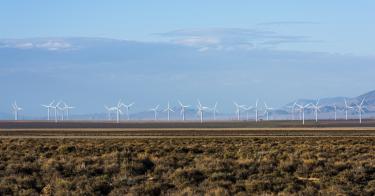Liberals love to talk about helping the poor and the middle class. So why are Nevada Democrats pushing one of the most regressive taxes in modern times?
Question 6 on the ballot in Nevada this November would require half of the state’s electric power production to come from renewable energy by 2030. The main driver of this initiative is NextGen Climate Action. NextGen and other proponents like to say that Question 6 will be virtually cost-free to Nevadans.
Really? In my new study for the Heritage Foundation, I examined the disappointing results of states such as California, New York and Vermont that have already adopted similar energy regulations. The results should be worrisome to Nevada citizens.
States with renewable mandates that are near the levels contemplated for Nevada have average power costs roughly 50 percent higher to twice as high as states such as Nevada that allow utilities to buy the cheapest energy from the power grid.
A recent Wall Street Journal analysis found that California, which has already moved to a 50 percent green energy mandate, charges businesses and families 67 percent more for electricity than cheaper states such as Nevada and Arizona. Thanks in part to its stringent renewable mandate, the Journal reports, “Since 2011, California’s electricity rates have surged 30 percent compared to an 8 percent increase nationwide.”
Florida, by contrast, uses natural gas, solar energy, clean coal and nuclear power and doesn’t have a clean energy mandate. Its costs have fallen by 3 percent over this same period. Does Nevada want to be like high-cost California or low-cost Florida?
Question 6’s hardest-hit victims will be low-income families. The Census Bureau reports the poor pay about 10 times more of their income on energy than do rich families. The energy mandate is Robin Hood in reverse: It steals from the poor to soothe the consciences of the very rich.
These price hikes on the working class might make some sense if the scheme would actually clean the air — but it won’t. The mandate doesn’t include nuclear power or natural gas as “clean energy” sources, even though they’re among the environmentally safest producers of energy. Even coal-burning plants are far cleaner today than 30 years ago, with pollution reductions of 30, 40 and even 50 percent for lead, carbon monoxide and smog.
The initiative would foolishly restrict Nevada’s natural gas use at a time when America is in the midst of the biggest shale gas boom in history. Natural gas prices have fallen over the past decade by 70 percent, thanks to domestic shale gas production. Conversion to natural gas is the reason the United States has reduced its greenhouse gas emissions more than virtually any other nation over the past decade.
Nuclear energy is even cleaner because it emits virtually zero air pollutants into the atmosphere. Why would a green mandate exclude nuclear and potentially force the closure of nuclear plants that are cheap, efficient and the least likely to add to global warming?
Many Nevadans I talk to say that people move from California to Nevada to get away from California’s crazy regulations and high costs. Question 6 follows the states with the most expensive energy costs. We estimate that the average Nevada family would pay between $500 and $1,000 a year more in electric power bills every year if this initiative passed.
Yes, sunny Nevada is an ideal state for solar power. As it gets cheaper, the state should use solar whenever it makes financial sense. But politicians shouldn’t force you to buy it regardless of cost. It doesn’t make sense to insert into the state constitution a requirement on energy use that locks Nevada into 50 percent wind and solar.
Betting the state’s financial future and job base on wind and solar power is a huge risk to Nevada’s economic health.
This piece originally appeared in the Las Vegas Review Journal



